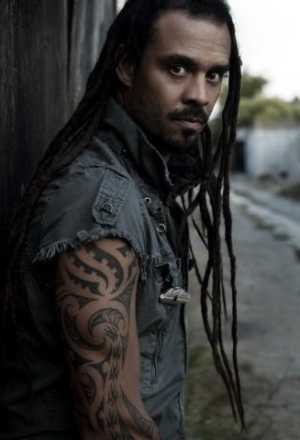|
Taken from The Boston Globe (February 23, 2010)
Michael Franti’s love song for the world
by Sarah Rodman, Globe Staff

"I always look at everything in some sociopolitical realm
... Right now it’s a time in the world where people want
to hear happy songs," says Michael Franti of Spearhead. |
Michael Franti has been making music for over 20 years. Much of that music has had a serious social and political bent dealing with issues like race, immigration, and economic injustice. So it was as much a surprise to Franti, a Bay Area native, as it was to his fans when he scored a top 20 hit last year with the chipper, reggae-tinged jam "Say Hey (I Love You)" from his band Spearhead’s 2008 album, "All Rebel Rockers." We recently chatted with Franti, who opens for John Mayer at TD Garden tomorrow night, about unlikely hits and Mayer’s recent missteps.
Q. Is it even a little hard for you to believe that you’ve had a big hit single?
A. To be frank we had never had a song in the top 40,000 before, so to be in the top 40 was really remarkable. My appendix burst the week that the song went into the top 20. So I’m on the gurney going down to get it repaired and I’m thinking, great, I finally have a song in the top 20 and I’m not going to live to hear it on the radio.
Q. Why do you think it happened with that song?
A. It’s a happy song, it has an infectious chorus and a great beat. I always look at everything in some sociopolitical realm and I think that right now it’s a time in the world where people want to hear happy songs.
Q. Is it funny to you, as a musician who has been so vocal politically, that your first mainstream success is a love song?
A. I do find that ironic [laughs]. I have written lots of political songs but the reason I’ve always written songs about what’s happening in life is because I just want to have an opportunity for my kids to live in a decent neighborhood and go to a decent school and be aware of what’s happening in the world and fall in love when they get into the ninth grade. It’s the simple things that mean the most to me and as I’ve traveled, I’ve seen they mean the most to other people. When I go to Iraq and Israel and Palestine, people want the same stuff. They say, don’t sing us songs about the harshness of the war, play something that makes us clap and dance and sing.
Q. What was your reaction to John Mayer’s race-related remarks in Playboy?
A. I immediately went to him and, you know, I’ve spent some time with John and I know he’s not a racist pig, but he definitely, in this interview, comes off as the biggest [expletive] that ever walked the earth. I just went up to him and said, sounds like you had a rough day, tell me about it. So he sat down and told me all about how . . . in this situation he said things that really hurt his band members and he really, really regretted it and he was doing everything he could to take responsibility for it for himself, for his family, for his band members, and for all his fans. This tour has been a real soul-searching experience for him.
Interview was condensed and edited.
© Copyright 2010 Globe Newspaper Company.
|